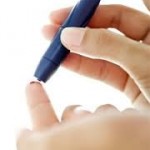 Gestational (jes-TAY-shun-ul) diabetes is diabetes that is found for the first time when a woman is pregnant. Out of every 100 pregnant women in the United States, three to eight get gestational diabetes. Diabetes means that your blood glucose (also called blood sugar) is too high. Your body uses glucose for energy. But too much glucose in your blood can be harmful. When you are pregnant, too much glucose is not good for your baby. (Spanish)
Gestational (jes-TAY-shun-ul) diabetes is diabetes that is found for the first time when a woman is pregnant. Out of every 100 pregnant women in the United States, three to eight get gestational diabetes. Diabetes means that your blood glucose (also called blood sugar) is too high. Your body uses glucose for energy. But too much glucose in your blood can be harmful. When you are pregnant, too much glucose is not good for your baby. (Spanish)
A service of the National Institute of Diabetes and Digestive and Kidney Diseases (NIDDK), National Institutes of Health (NIH)





